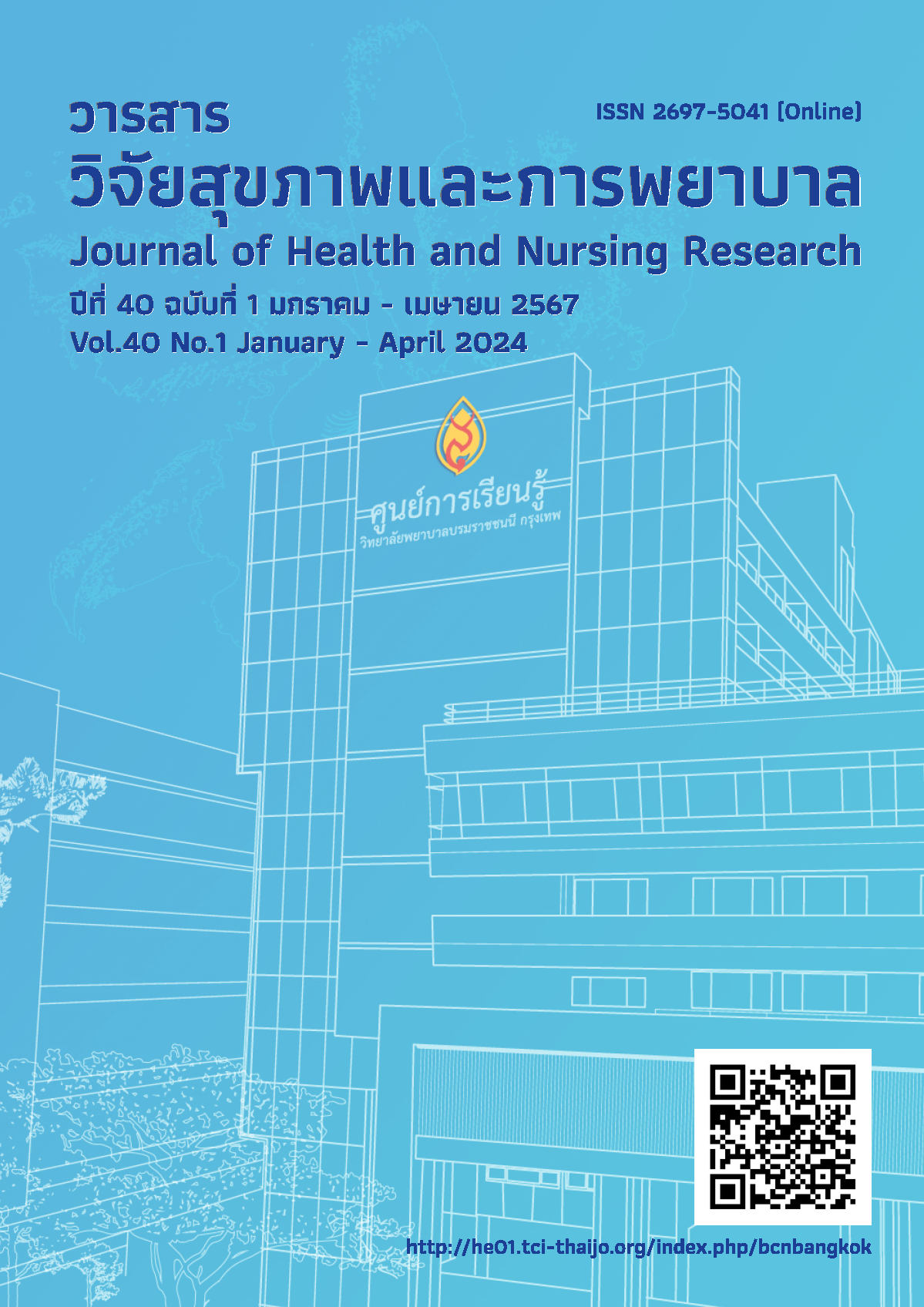ผลของการใช้รูปแบบพัฒนาศักยภาพสมองโดยทีมสหวิชาชีพสำหรับผู้สูงอายุที่มี ภาวะการรู้คิดบกพร่องเล็กน้อย ในสถานดูแลผู้สูงอายุเฉพาะกลางวันในเขตเมือง
คำสำคัญ:
การพัฒนาศักยภาพสมอง , ภาวะการรู้คิดบกพร่องเล็กน้อย, ทีมสหวิชาชีพ , ผู้สูงอายุ, สถานดูแลผู้สูงอายุเฉพาะกลางวันบทคัดย่อ
บทนำ: ภาวะรู้คิดบกพร่องเล็กน้อยนำไปสู่การเกิดภาวะสมองเสื่อมได้ การชะลอการเกิดภาวะสมองเสื่อมทำได้โดยการกระตุ้นการรู้คิด
วัตถุประสงค์การวิจัย: เพื่อศึกษาผลของการใช้รูปแบบการพัฒนาศักยภาพสมองโดยทีมสหวิชาชีพต่อ การรู้คิด การดำเนินชีวิตประจำวัน ความวิตกกังวลและภาวะซึมเศร้า สำหรับผู้สูงอายุที่มีภาวะการรู้คิดบกพร่องเล็กน้อยในสถานดูแลผู้สูงอายุเฉพาะกลางวันในเขตเมือง
ระเบียบวิธีวิจัย: การวิจัยกึ่งทดลองแบบเปรียบเทียบ 2 กลุ่ม และประเมินผลก่อนการทดลอง หลังการทดลองทันทีและติดตามผล 1 เดือนหลังการทดลอง คัดเลือกกลุ่มตัวอย่างแบ่งเป็น 2 กลุ่ม ด้วยการเลือกแบบเฉพาะเจาะจง กลุ่มทดลองจำนวน 13 คน เป็นผู้สูงอายุที่มีภาวะการรู้คิดบกพร่องเล็กน้อยในสถานดูแลผู้สูงอายุเฉพาะกลางวันและได้รับรูปแบบพัฒนาศักยภาพสมองจำนวน 6 ครั้งๆ ละ 3 ชั่วโมง ทุก 2 สัปดาห์ กลุ่มควบคุมจำนวน 14 คนได้รับการดูแลตามปกติ เก็บรวบรวมข้อมูลโดยใช้แบบประเมินภาวะการรู้คิด การดำเนินชีวิตประจำวัน ความวิตกกังวลและภาวะซึมเศร้า วิเคราะห์ข้อมูลโดยใช้สถิติเชิงพรรณา, Friedman test, Wilcoxon signed rank test, และ Mann-Whitney U-test
ผลการวิจัย: กลุ่มทดลองมีค่าเฉลี่ยภาวะการรู้คิดหลังการทดลองและระยะติดตามผล 1 เดือน สูงกว่าก่อนการทดลองอย่างมีนัยสำคัญทางสถิติ เมื่อเปรียบเทียบระหว่างกลุ่มในระยะหลังการทดลองและติดตามผล 1 เดือน พบว่า กลุ่มทดลองมีค่าเฉลี่ยภาวะการรู้คิดดีขึ้น และมีความวิตกกังวลและภาวะซึมเศร้าลดลงกว่ากลุ่มควบคุมอย่างมีนัยสำคัญทางสถิติ แต่มีค่าเฉลี่ยการดำเนินชีวิตประจำวันลดลงกว่ากลุ่มควบคุมอย่างมีนัยสำคัญทางสถิติ
สรุปผล: รูปแบบการพัฒนาศักยภาพสมองสำหรับผู้ที่มีภาวะการรู้คิดบกพร่องเล็กน้อยช่วยให้ภาวะการรู้คิดดีขึ้น และความวิตกกังวลและภาวะซึมเศร้าลดลง
ข้อเสนอแนะ: ผู้บริหาร พยาบาลและทีมสหวิชาชีพในสถานดูแลผู้สูงอายุเฉพาะกลางวันในเขตเมืองควรจัดกิจกรรมเพื่อพัฒนาศักยภาพสมองให้กับผู้สูงอายุที่มีภาวะการรู้คิดบกพร่องเล็กน้อยอย่างต่อเนื่อง
Downloads
เอกสารอ้างอิง
Knopman DS, Peterson RC. Mild cognitive impairment and mild dementia: A clinical perspective. Mayo Clin Proc. 2014; 89(10):1452–59. doi: 10.1016/j.mayocp.2014.06.019.
Gillis C, Mirzaei F, Potashman M, Ikram MA , Maserejian N. The incidence of mild cognitive impairment: A systematic review and data synthesis. Alzheimers Dement (Amst) 2019 Mar 8;11:248-56. doi: 10.1016/j.dadm.2019.01.004.
American Psychiatric Association. Diagnostic and statistical manual of mental disorders. Fifth Edition, Washington, DC: American Psychiatric Association; 2013:591-644.
World Health Organization. Healthy Ageing in World Report on Ageing and Health. Geneva, World Health Organization; 2015.
World Health Organization. Integrated care for older people (ICOPE): Guidance for person-centered assessment and pathways in primary care [Internet]. 2018 [cited 2022 May 22]. Available from: https://apps.who.int/iris/bitstream/handle/10665/326843/WHO-FWC-ALC-19.1-eng.pdf?sequence=17&isAllowed=y
Bahar-Fuchs A, Martyr A, Goh AMY, Sabates J, Clare L. Cognitive training for people with mild to moderate dementia. Cochrane Database Syst Rev. 2019; 25; 3(3) :CD013069.
Wongjan J, Leethong-in M, Piyawattanpong. Impact of brain exercise program on older adults’ cognition. Journal of Thailand and Midwifery Council 2020;70-84. (in Thai)
Institute of Geriatric Medicine, Department of Medical Services, Ministry of Public Health, Faculty of Medicine Ramathibodi Hospital Mahidol University, Dementia Caregiver Association and Thai Health Promotion Foundation. Cognitive stimulation in people with mild cognitive impairment. 1st edition. Bangkok: Cyberprint Group Company Limited; 2016. (in Thai)
Apichanakit, S. et al. Effectiveness of the program to develop brain potential in the elderly. with early memory impairment of community health centers Udon Thani Hospital Network. Udon Thani Hospital Medical Journal 2019;27(2):138–49. (in Thai)
Nakawiro, D. et al. Group-Based Training of Executive Function, Attention, Memory and Visuospatial Function (Team-V) in Patients with Mild Neurocognitive Journal of the Psychiatry Association of Thailand 2017;62(4):337-348. (in Thai)
Srisuwan P, Nakawiro D, Chansirikarnjana S, Kuha O, Chaikongthong P, & Suwannagoot T. Effects of a group-based 8-week multicomponent cognitive training on cognition, mood and activities of daily living among healthy older adults: A one-year follow-up of a randomized controlled trial. The Journal of Prevention of Alzheimer’s Disease 2020;7(2):112-21. doi: 10.14283/jpad.2019.42.
Institute of Geriatric Medicine, Department of Medical Services, Ministry of Public Health, Faculty of Medicine Ramathibodi Hospital Mahidol University Hand book of cognitive training in older persons with mild cognitive impairment for health care personnel. 1st printing. Bangkok: Sinthawee Printing; 2020. (in Thai)
Nasreddine Z, Phillips N, Bedirian V. et al. The Montreal Cognitive Assessment (MoCA): A brief screening tool for mild cognitive impairment. Journal of the American Geriatrics Society 2005;53(4):695-99.
Lawton MP, Brody EM. Assessment of older people: self-maintaining and instrumental activities of daily living. Gerontologist. 1969;9:179-86.
Nilchaikovit, T Lortrakul, M, Phisansuthideth, U. Development of Thai version of Hospital Anxiety and Depression Scale in cancer patients. Journal of the Psychiatric Association of Thailand 1996;41(1):18-30. (in Thai)
Duangkaew J, Saset S. The effect of cognitive program on cognitive function in mild cognitive impairment older people in governmental welfare home for the aged. Journal of The Police Nurse 2018;10(1), 12–20. (in Thai)
Woods B, Aguirre E, Spector AE, Orrell M. Cognitive Stimulation to Improve Cognitive Functioning in People with Dementia. Cochrane Database of Systematic Reviews Cochrane Database Systematic Review, (2), CD005562.;2012.
Praiso P, Chuajedto P. Factors Related to Mild Cognitive Impairments in Elderly People in Chiang Rai Province. The Journal of The Nursing and Midwifery Council 2018;32(1),64-80. (in Thai)
Petersen RC, Negash S. Mild cognitive impairment: an overview. CNS Spectrums 2008; 13(1):45-53.
Kansri J, Soonthornchaiya R, Somprasert C. The effect of the cognitive rehabilitation program on depression among older adults with cognitive impairment. Journal of Boromarajonani College of Nursing, Bangkok;34(1):35-46. (in Thai)
ดาวน์โหลด
เผยแพร่แล้ว
รูปแบบการอ้างอิง
ฉบับ
ประเภทบทความ
สัญญาอนุญาต
ลิขสิทธิ์ (c) 2024 วารสารวิจัยสุขภาพและการพยาบาล (วารสารวิทยาลัยพยาบาลบรมราชชนนี กรุงเทพ)

อนุญาตภายใต้เงื่อนไข Creative Commons Attribution-NonCommercial 4.0 International License.
บทความที่ได้รับการตีพิมพ์ เป็นลิขสิทธิ์ของวารสารวิจัยสุขภาพและการพยาบาล (วิทยาลัยพยาบาลบรมราชชนนี กรุงเทพ) ไม่สามารถนำไปตีพิมพ์ซ้ำในวารสารฉบับอื่น


















